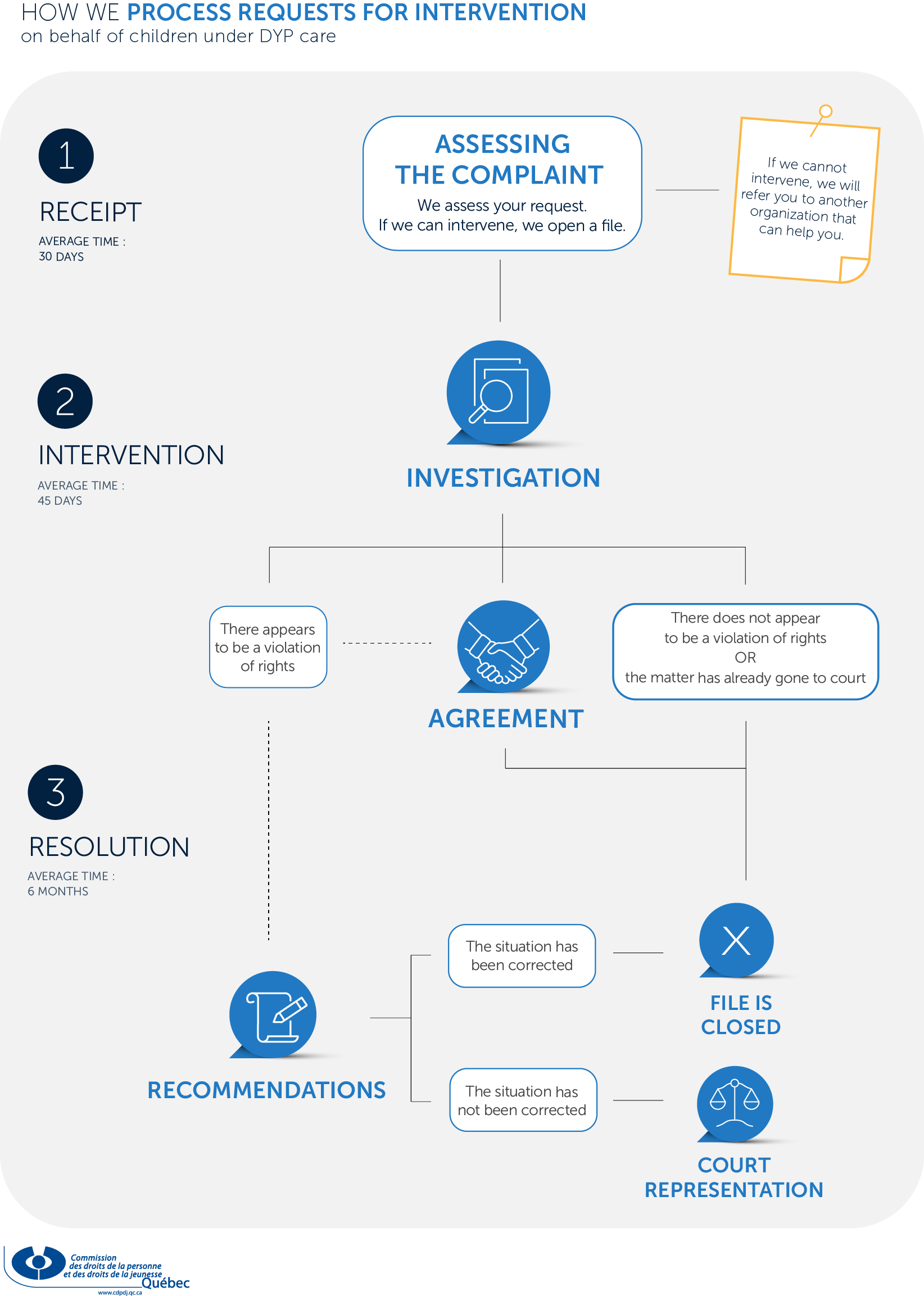Complaint or request for intervention process

-
 Human rights
Human rightsCharter complaint process
Complaints of discrimination, harassment, exploitation or reprisals are processed according to the Charter of Human Rights and Freedoms.
Staff members of the Commission explain the complaint process.

Printable version of the Complaint process
1. Receipt
Assessing the complaint
- An intake and evaluation technician opens a file and assesses whether your complaint is 'admissible', meaning that the Commission can process it. This person might contact you for more information.
- If the Commission cannot intervene in your complaint, we will refer you to an organization that can, like the Commission des normes, de l'équité, de la santé et de la sécurité du travail, the Tribunal administratif du logement, your union, etc.
2. Intervention
Gathering information
An evaluation advisor:
- contacts you to clarify the details of your complaint and to make sure that nothing is missing
- contacts the respondent to let them know that a complaint has been filed against them
- finds out if you and the respondent (the 'parties') are open to settling the case out of court, through mediation.
Gathering information is the first step in our investigation
Deciding how to proceed
- If the parties agree to try mediation, your file is transferred to a mediator.
- If the parties refuse mediation, the investigation may continue.
- At this stage, the Commission may decide not to intervene in your case. This could happen for several reasons, for example, if you have already taken the matter to court, or if you filed the complaint after the legal time limit for doing so. Your file will then be closed. (Learn more about the Commission’s reasons for closing a file).
3. Resolution
Mediation
- Mediation takes place only if both parties (you and the respondent) agree to it.
- A mediator will contact you and the respondent. Then, the mediator will meet with you both to help you find common ground.
- If you can reach an agreement, the mediation worked. In that case, a memorandum of agreement is prepared and signed by both parties. The complaint is now resolved, and the file will be closed.
- If you cannot agree, the mediation didn’t work. In that case, the file will be transferred to an investigator.
Investigation
An investigation takes place only if the parties (you and the respondent) did not wish to try mediation or if you could not reach an agreement during mediation.
Gathering evidence
- An investigator gathers evidence about the complaint (documents, audio or video recordings, testimony, etc.). The investigator’s role is to determine whether there is sufficient evidence to support the claims in your complaint.
- At any point during the investigation, you and the respondent can settle the case on your own by coming to an agreement.
The Complaints Committee’s decision
- The investigator submits a report to the Complaints Committee. This committee is made up of three members of the Commission.
- The Complaints Committee assesses whether there is sufficient evidence to support the complaint, and then makes a decision.
Sufficient evidence | Proposal for corrective measures
- If the Complaints Committee finds that there is sufficient evidence to support your complaint, it can propose various corrective measures to the respondent.
- The respondent will be given a deadline for implementing the corrective measures.
- Once the respondent has implemented the corrective measures, your file will be closed.
- If the respondent does not implement the corrective measures, the Complaints Committee can ask the Commission to take the matter to court on your behalf.
Examples of corrective measures
- reinstating the complainant to their position
- providing a discrimination awareness workshop for employees
- paying material, moral, or punitive damages to the complainant
Sufficient evidence | Decision to represent you in court
- If the respondent does not implement the corrective measures that the Complaints Committee has proposed, the Commission can take the matter to the Human Rights Tribunal to request appropriate action on your behalf. In this case, a lawyer from the Commission will represent you before the Tribunal, free of charge.
Sufficient evidence | Decision not to represent you in court
- Sometimes, even if there is sufficient evidence to support your complaint, the Complaints Committee may decide not to ask the Commission to represent you at the Human Rights Tribunal. This could be the case, for example, if your dispute does not raise any complex questions of fact or law. The Commission assesses each case in light of the particular circumstances of the file. (Learn more about the Commission’s reasons for closing a file).
- The Commission sends the parties a letter to inform them of this decision. This letter includes the supporting evidence that we have gathered, so that you can use it if you decide to take the case to court yourself.
- Even if the Commission closes your file, you can initiate a claim with the Human Rights Tribunal at your own expense. To do this, you have 90 days from the date when you received notice from the Commission that your file was closed. This limitation period is known under Québec law as a prescription.
Insufficient evidence | Decision to close your file
- If the Complaints Committee finds that there is insufficient evidence to support your complaint, the Commission 'ceases to act', meaning that we close your file.
- The Commission sends the parties a letter to inform them of this decision.
- Even if the Commission closes your file, you can initiate a claim with the civil courts (e.g., the Superior Court or the Small Claims Division or another division of the Court of Québec), at your own expense.
Who handles your complaint?
You will communicate with various people at the Commission while your complaint is being processed. Each person has a unique and important role in handling your complaint.
Office clerk
This person responds to requests for information and helps people file complaints with the Commission. They keep files up-to-date by adding any relevant documents.
Intake and evaluation technician
This person analyzes complaints using the criteria set out in the Charter of Human Rights and Freedoms and opens an investigation file if the complaint is admissible.
Evaluation advisor
This person contacts the parties to gather more information about the complaint, to get the respondent’s version of events, and to suggest mediation.
Mediator
This person meets with the parties to help them resolve their dispute outside of court.
Learn more about mediationInvestigator
This person gathers evidence and submits an investigative report to the Complaints Committee for a decision.
Learn more about investigationsComplaints Committee
This committee, made up of three Commission members, makes decisions based on the results of the investigation into your complaint.
Lawyer
This person represents you at the Human Rights Tribunal at the request of the Complaints Committee.
Learn more about court representationTo file a complaint, please complete the online complaint form at plainte.cdpdj.qc.ca/en.
If you need help filling out the form, email us at plainte@cdpdj.qc.ca or call 1 800 361 6477.
-
 Youth protection
Youth protectionRequest for intervention process
Staff members of the Commission explain how your request for intervention will be processed.

Downloadable version intervention request process Version for youth of the intervention request process
1. Receipt
Assessing the request for intervention
A representative of the Commission will contact you.
This person studies your request and determines whether the Commission has jurisdiction to intervene.
For the Commission to intervene, this person must determine that:
- it appears that the rights of a child (or group of children) are not being respected (possible violation of rights)
- the matter has not already been taken to the Court of Québec Youth Division
If the Commission has jurisdiction to intervene, we will open a case for the child and transfer it to one of our investigators.
If the Commission cannot intervene, we will refer you to an organization that can, like your local complaints commissioner or a users’ committee. 2. Intervention
Investigation
Next, an investigator will:
- contact you to go over your request and ask for any information that is still needed.
- contact the person whom you think is violating the child’s rights to inform them that a request for intervention has been made and to try to reach an agreement for correcting the situation.
Decision
Once the investigation is complete, a report will be transferred to our Investigation Committee. The Investigation Committee is made up of three members of the Commission. The committee makes one of two possible decisions in the case.
- Insufficient evidence: If the committee does not find sufficient evidence that a young person’s rights are being violated, the case will be closed.
- Sufficient evidence: If the Committee finds sufficient evidence that a young person’s rights are being violated, it will make recommendations to the individuals or organizations responsible.
3. Resolution
AGREEMENT
An agreement is possible if the person accused of violating the child’s rights corrects the situation.
- If an agreement is reached, the Commission closes the file.
- If an agreement cannot be reached, the investigator continues to gather evidence and then writes a report.
In 75% to 80% of cases where it appears that a young person’s rights are being violated, the Commission’s intervention makes it possible to correct the situation at this stage by reaching an agreement. RECOMMENDATIONS
The Investigation Committee’s recommendations aim to:
- Put an end to the behaviour (the violation of a young person’s rights).
or
- Correct the situation so that the violation of rights cannot happen again.
Examples of recommendations and corrective measures
- Ensure that young people living in rehabilitation centres know about their rights and legal remedies
- Ensure the cultural safety of young people living in institutions
- Ensure that the social follow-up provided to children complies with the law.
COURT REPRESENTATION
The Commission may take the matter to the Youth Division of the Court of Québec if our recommendations are not implemented on time.
Who processes your request?
You will communicate with various people at the Commission while your request for intervention is being processed. Each person has a unique and important role in handling your request.
Reception and assessment technician
This person responds to requests for information and helps people make requests for intervention. They analyze requests for intervention using the criteria set out in the Youth Protection Act (YPA) and open an investigation file if the Commission has jurisdiction to intervene.
Investigator
This person gathers evidence and writes a report. They also try to obtain an agreement to put an end to the violation of rights and make sure it cannot happen again. If an agreement cannot be reached, they submit a report to the Investigation Committee for a decision.
Learn more about investigationsInvestigation Committee
This committee, made up of three Commission members, makes decisions about your request based on the investigator’s report.
You can send us a request for intervention in several ways.
- Online form: https://plainte.cdpdj.qc.ca/en
- Email: jeunesse@cdpdj.qc.ca
- Phone: 1 800 361-6477, Option 3
Frequently asked questions
Here are some of the most common questions that we receive about the complaint process.
